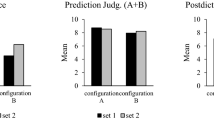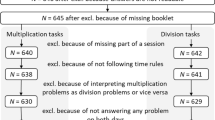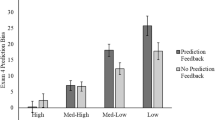Abstract
Calibration, or the correspondence between perceived performance and actual performance, is linked to students’ metacognitive and self-regulatory skills. Making students more aware of the quality of their performance is important in elementary school settings, and more so when math problems are involved. However, many students seem to be poorly calibrated, with a tendency towards over-confidence. The present study analyzes the relationship between post-performance calibration accuracy and the metacognitive process shown by 524 fifth- and sixth-grade students while solving two math problems. After calculating a calibration index and establishing the stability of students’ judgments and actual performance, differences in the metacognitive process exhibited by students with different calibration accuracy (Accurate vs. Inaccurate groups) were analyzed. The emergence of different calibration patterns and differences in the metacognitive process as a function of mathematics achievement and grade level were also examined. Results indicated that: (a) students in the overall sample were little calibrated and over-confident, showing high stability in their judgments and actual performance across problems; (b) inaccurate students reported using information representation sub-processes (drawing/summarizing) less frequently, but writing and reviewing (and also correcting mistakes) more frequently than their accurate peers; and (c) differences in calibration patterns and the metacognitive process were found when achievement level was considered, whereas grade level did not generate any important effect. These findings suggest the usefulness of process-based measures to examine the metacognitive processes involved in making post-performance judgments, considering achievement and its possible mediating role in this relationship.


Similar content being viewed by others
References
Ackerman, P. L., & Wolman, S. D. (2007). Determinants and validity of self-estimates of abilities and self-concept measures. Journal of Experimental Psychology: Applied, 13, 57–78.
Adedokun, O. A., & Burgess, W. D. (2012). Analysis of paired dichotomous data: a gentle introduction to the McNemar test in SPSS. Journal of Multidisciplinary Evaluation, 8(17), 125–131.
Adeyemi, O. (2011). Measures of association for research in educational planning and administration. Research Journal of Mathematics and Statistics, 3(3), 82–90.
Alexander, P. A. (2013). Calibration: What is it and why it matters? An introduction to the special issue on calibrating calibration. Learning and Instruction, 24, 1–3. doi:10.1016/j.learninstruc.2012.10.003.
Arbuckle, J. L. (2010). SPSS (version 19.0) [Computer program]. Chicago: SPSS.
Azevedo, R., & Aleven, V. (2013). International handbook of metacognition and learning technologies (Springer International Handbooks of Education, Vol. 28). New York: Springer. doi:10.1007/978-1-4419-3_11.
Bandura, A. (1986). Social foundations of thought and action: A social cognitive theory. Englewood Cliffs: Prentice-Hall.
Bannert, M., & Mengelkamp, C. (2008). Assessment of metacognitive skills by means of instruction to think aloud and reflect when prompted. Does the verbalization method affect learning? Metacognition and Learning, 3, 39–58.
Boekaerts, M. (1999). Motivated learning: studying student situation transactional units. European Journal of Psychology of Education, 14(1), 41–55. doi:10.1007/bf03173110.
Boekaerts, M., & Rozendaal, J. S. (2010). Using multiple calibration measures in order to capture the complex picture of what affects students’ accuracy of feeling of confidence. Learning and Instruction, 20(4), 372–382. doi:10.1016/j.learninstruc.2009.03.002.
Bol, L., & Hacker, D. J. (2001). A comparison of the effects of practice tests and traditional review on performance and calibration. The Journal of Experimental Education, 69, 133–151.
Bol, L., Hacker, D. J., O’Shea, P., & Allen, D. (2005). The influence of overt practice, achievement level, and explanatory style on calibration accuracy and performance. Journal of Experimental Education, 73, 269–290. doi:10.3200/JEXE.73.4.269-290.
Bol, L., Riggs, R., Hacker, D. J., & Nunnery, J. (2010). The calibration accuracy of middle school students in math classes. Journal of Research in Education, 21, 81–96.
Bol, L., Hacker, D. J., Walck, C. C., & Nunnery, J. A. (2012). The effects of individual or group guidelines on the calibration accuracy and achievement of high school biology students. Contemporary Educational Psychology, 37, 280–287. doi:10.1016/j.cedpsych.2012.02.004.
Boston, M. D., & Smith, M. S. (2009). Transforming secondary mathematics teaching: increasing the cognitive demands of instructional tasks used in teachers’ classrooms. Journal for Research in Mathematics Education, 40(2), 119–156.
Bouffard, T., & Narciss, S. (2011). Benefits and risks of positive bias in self-evaluation of academic competence. International Journal of Educational Research, 50(4), 205–256.
Bouffard, T., Vezeau, C., Roy, M., & Lengelé, A. (2011). Stability of biases in self-evaluation and relations to well-being among elementary school children. International Journal of Educational Research, 50, 221–229. doi:10.1016/j.ijer.2011.08.003.
Bowles, M. A., & Leow, R. P. (2005). Reactivity and type of verbal report in SLA research methodology. Studies in Second Language Acquisition, 27, 415–440.
Bransford, J. D., & Stein, B. S. (1993). The ideal problem solver: A guide for improving thinking, learning and creativity (2nd ed.). New York: W.H. Freeman.
Butler, R. (2011). Are positive illusions about academic competence always adaptive, under all circumstances? New results and future directions. International Journal of Educational Research, 50, 251–256. doi:10.1016./j.ijer.2011.08.001.
Callander, S. (2011). Searching and learning by trial and error. American Economic Review, 101(6), 2277–2308. doi:10.1257/aer.101.6.2277.
Cleary, T. J. (2009). Monitoring trends and accuracy of self-efficacy beliefs during interventions: advantages and potential applications to school-based settings. Psychology in the Schools, 46, 154–171. doi:10.1002/pits.20360.
Cleary, T. J., & Chen, P. (2009). Self-regulation, motivation, and math achievement in middle school: variations across grade level and math context. Journal of School Psychology, 47, 291–314. doi:10.1016/j.jsp.2009.04.002.
Clements, D. H., Sarama, J., & Liu, X. (2008). Development of a measure of early mathematics achievement using the Rasch model: the research-based early maths assessment. Educational Psychology, 28(4), 457–482. doi:10.1080/01443410701777272.
Cohen, J. (1988). Statistical power analysis for the behavioral sciences (2nd ed.). New York: Academic.
Desoete, A., & Roeyers, H. (2006). Metacognitive macro-evaluations in mathematical problem-solving. Learning and Instruction, 16, 12–25.
DiGiacomo, G. (2014). Enhancing self-monitoring and self-reflection through a self-regulatory skills intervention embedded in a middle school mathematics curriculum. Dissertations and Theses, 2014-Present. Paper 201. http://works.gc.cuny.edu/etd/201.
Dijk, I. M. A. W., Van Oers, B., & Terwel, J. (2003). Providing or designing? Constructing models in primary maths education. Learning and Instruction, 13, 53–72. doi:10.1016/S0959-4752(01)00037-8.
Dinsmore, D., Alexander, P., & Loughlin, S. (2008). Focusing the conceptual lens on metacognition, self-regulation, and self-regulated learning. Educational Psychology Review, 20, 391–409.
Dinsmore, D. L., & Parkinson, M. M. (2013). What are confidence judgments made of? Students’ explanations for their confidence ratings and what that means for calibration. Learning and Instruction, 24, 4–14. doi:10.1016/j.learninstruc.2012.06.001.
Dunlosky, J., & Rawson, K. A. (2012). Over-confidence produces underachievement: inaccurate self-evaluations undermine students’ learning and retention. Learning and Instruction, 22, 271–280. doi:10.1016/j.learninstruc.2011.08.003.
Dunlosky, J., & Thiede, K. W. (2013). Four cornerstones of calibration research: why understanding students’ judgments can improve their achievement. Learning and Instruction, 24, 58–61. doi:10.1016/j.learninstruc.2012.05.002.
Dupeyrat, C., Escribe, C., Huet, N., & Régner, I. (2011). Positive biases in self-assessment of mathematics competence, achievement goals, and mathematics performance. International Journal of Educational Research, 50(4), 241–250. doi:10.1016/j.ijer.2011.08.005.
Efklides, A., & Misailidi, P. (2010). Trends and prospects in metacognition research. New York: Springer.
Ericsson, K. A., & Simon, H. A. (1996). Protocol analysis: Verbal reports as data (Revisedth ed.). Cambridges: MIT Press.
Fagnant, A., & Vlassis, L. (2013). Schematic representations in arithmetical problem-solving: analysis of their impact on grade 4 students. Educational Studies in Mathematics, 84(1), 149–168.
Finn, B., & Metcalfe, J. (2014). Over-confidence in children’s multi-trial judgments of learning. Learning and Instruction, 32, 1–9. doi:10.1016/j.learninstruc.2014.01.001.
Fox, M. C., Ericsson, K. A., & Best, R. (2011). Do procedures for verbal reporting of thinking have to be reactive? A meta-analysis and recommendations for best reporting methods. Psychological Bulletin, 137, 316–344. doi:10.1037/a0021663.
García, T., & González-Pienda, J. A. (2012). Evaluación del proceso de aprendizaje autorregulado en el área de las matemáticas mediante pizarras digitales. [Assessment of the self-regulated learning process in Mathematics through electronic blackboards]. In J. Dulac & C. Alconada (Eds.), (Coords.), III Congreso pizarra digital. Publicación de comunicaciones (pp. 105–117). Madrid: Pluma y Arroba.
García, J. N., & Rodríguez, C. (2007). Influence of the recording interval and a graphic organizer on the writing process/product and on other psychological variables. Psicothema, 19(2), 198–205.
García, T., Betts, L., González-Castro, P., González-Pienda, J. A., & Rodríguez, C. (2015). On-line assessment of the process involved in Maths problem-solving in fifth and sixth grade students: Self-regulation and achievement. Revista Latinoamericana de Investigación en Matemática Educativa.
Gick, M. L. (1986). Problem-solving strategies. Educational Psychologist, 21, 99–120.
Gonida, E. N., & Leondari, A. (2011). Patterns of motivation among adolescents with biased and accurate self-efficacy beliefs. International Journal of Educational Research, 50(4), 209–211. doi:10.1016/j.ijer.2011.08.002.
Gramzow, R. H., Elliot, A. J., Asher, E., & McGregor, H. A. (2003). Self-evaluation bias and academic performance: some ways and some reasons why. Journal of Research in Personality, 37, 41–61.
Hacker, D. J., & Bol, L. (2004). Metacognitive theory: Considering the social-cognitive influences. In D. M. McInerney & S. Van Etten (Eds.), Big theories revisited (Research on sociocultural influences on motivation and learning, Vol. 4, pp. 275–297). Greenwich: Information Age.
Hacker, D. J., Bol, L., Horgan, D. D., & Rakow, E. A. (2000). Test prediction and performance in a classroom context. Journal of Educational Psychology, 92, 160–170.
Hacker, D. J., Bol, L., & Bahbahani, K. (2008a). Explaining calibration accuracy in classroom contexts: the effects of incentives, reflection, and explanatory style. Metacognition and Learning, 3, 101–121. doi:10.1007/s11409-008-9021-5.
Hacker, D. J., Bol, L., & Keener, M. C. (2008b). Metacognition in education: A focus on calibration. In J. Dunlosky & R. Bjork (Eds.), Handbook of memory and metacognition (pp. 429–455). Mahwah: Erlbaum.
Hadwin, A. F., & Webster, E. A. (2013). Calibration in goal setting: examining the nature of judgments of confidence. Learning and Instruction, 24(12), 37–47. doi:10.1016/j.learninstruc.2012.10.001.
Hattie, J. (2013). Calibration and confidence: where to next? Learning and Instruction, 24, 62–66. doi:10.1016/j.learninstruc.2012.05.009.
Jacobse, A. E., & Harskamp, E. G. (2012). Towards efficient measurement of metacognition in mathematical problem-solving. Metacognition and Learning, 7(2), 133–149.
Kellog, R. T. (1987). Writing performance: effects of cognitive strategies. Written Communication, 4, 269–298.
Kramarski, B., & Gutman, M. (2006). How can self-regulated learning be supported in mathematical E-learning environments? Journal of Computer Assisted Learning, 22, 24–33. doi:10.1111/j.1365-2729.2006.00157.x.
Labuhn, A., Zimmerman, B., & Hasselhorn, M. (2010). Enhancing students’self-regulation and mathematics performance: the influence of feedback and self-evaluative standards. Metacognition and Learning, 5(2), 173–194. doi:10.1007/s11409-010-9056-2.
Lipko, A. R., Dunlosky, J., Hartwig, M. K., Rawson, K. A., Swan, K., & Cook, D. (2009). Using standards to improve middle school students’ accuracy at evaluating the quality of their recall. Journal of Experimental Psychology: Applied, 15(4), 307–318. doi:10.1037/a0017599.
Macbeth, G., Razumiejczyk, E., & Ledesma, R. D. (2011). Cliff’s delta calculator: a non-parametric effect size program for two groups of observations. Universitas Psychologica, 10(2), 545–555.
Maki, R. H., Shields, M., Wheller, A. E., & Zacchilli, T. L. (2005). Individual differences in absolute and relative metacomprehension accuracy. Journal of Educational Psychology, 97, 723–731.
Montague, M., Enders, G., & Dietz, S. (2011). Effects of cognitive strategy instruction on math problem-solving of middle school students with learning disabilities. Learning Disability Quarterly, 34(4), 262–272. doi:10.1177/073i9487M421762.
Moos, D. C., & Ringdal, A. (2012). Self-regulated learning in the classroom: A literature review on the teacher’s role. Education Research International, 2012, Article ID 423284. doi:10.1155/2012/423284.
Narciss, S., Koerndle, H., & Dresel, M. (2011). Self-evaluation accuracy and satisfaction with performance: are there affective costs or benefits of positive self-evaluation bias? International Journal of Educational Research, 50, 230–240. doi:10.1016/j.ijer.2011.08.004.
Newton, S. J., Horner, R. H., Algozzine, R. F., Todd, A. W., & Algozzine, K. M. (2009). Using a problem-solving model to enhance data-based decision making in schools. In W. Sailor, G. Dunlap, G. Sugai, & R. Horner (Eds.), Handbook of positive behaviour support. Issues in clinical child psychology (pp. 551–580). New York: Springer.
Newton, S. J., Horner, R. H., Todd, A. W., Algozzine, R. F., & Algozzine, K. A. (2012). A pilot study of a problem-solving model for team decision making. Education and Treatment of Children, 35(1), 25–49. doi:10.1353/etc.2012.0001.
Nietfeld, J. L., Cao, L., & Osborne, J. W. (2005). Metacognitive monitoring accuracy and student performance in the postsecondary classroom. The Journal of Experimental Education, 74, 7–28.
Nietfeld, J. L., Cao, L., & Osborne, J. W. (2006). The effect of distributed monitoring exercises and feedback on performance, monitoring accuracy, and self-efficacy. Metacognition and Learning, 1, 159–179.
Olive, T., & Piolat, A. (2002). Suppressing visual feedback in written composition: effects on processing demands and coordination of the writing processes. International Journal of Psychology, 37(4), 209–218. doi:10.1080/00207590244000089.
Özsoy, G. (2012). Investigation of fifth grade students’ mathematical calibration skills. Educational Sciences: Theory and Practice, 12(2), 1190–1194.
Panadero, E., & Alonso-Tapia, J. (2014). How do students self-regulate? Review of Zimmerman’s cyclical model of self-regulated learning. Annals of Psychology, 30(2), 450–462. doi:10.6018/analesps.30.2.167221.
Parkinson, M. M., Dinsmore, D. L., & Alexander, P. A. (2010). Calibrating calibration: Towards conceptual clarity and agreement in calculation. Paper presented at the annual Meeting of the American Educational Research Association. CO: Denver.
Pennequin, V., Sorel, O., Nanty, I., & Fontaine, R. (2010). Metacognition and low achievement in mathematics: the effect of training in the use of metacognitive skills to solve mathematical word problems. Thinking and Reasoning, 16(3), 198–220. doi:10.1080/13546783.2010.509052.
Pereis, F., Dignath, C., & Schmitz, B. (2009). Is it possible to improve mathematical achievement by means of self-regulation strategies? Evaluation of an intervention in regular math classes. European Journal of Psychology of Education, 24(1), I7–I29. doi:10.1007/BF03173472.
Piolat, A., Roussey, J. Y., Olive, T., & Farioli, F. (1996). Charge mentale et mobilisation des processus redactionnels: examen de la procédure de Kellogg [Mental load and time processing of writing: test of Kellogg’s procedure]. Psychologie Française, 41–4, 339–354.
Piolat, A., Kellogg, R. T., & Farioli, F. (2001). The triple task technique for studying writing processes: on which task is attention focused? Current Psychology Letters: Brain Behavior and Cognition, 4, 67–83.
Piolat, A., Olive, T., & Kellogg, R. T. (2005). Cognitive effort during note taking. Applied Cognitive Psychology, 19, 291–312. doi:10.1002/acp.1086.
Polya, G. (1954). Mathematics and plausible reasoning. Princeton: Princeton University Press.
Rinne, L. F., & Mazzocco, M. M. M. (2014). Knowing right from wrong in mental arithmetic judgments: calibration of confidence predicts the development of accuracy. PLoS ONE, 9(7), e98663. doi:10.1371/journal.pone.0098663.
Rosário, P., Mourão, R., Núñez, J. C., González-Pienda, J. A., & Solano, P. (2008). Storytelling as a promoter of self-regulated learning (SRL) throughout schooling. In A. Valle, J. C. Núñez, R. G. Cabanach, J. A. González-Pienda, & S. Rodríguez (Eds.), Handbook of instructional resources and their applications in the classroom (pp. 107–122). New York: Nova Science.
Schraw, G. (2009). A conceptual analysis of five measures of metacognitive monitoring. Metacognition and Learning, 4, 33–45. doi:10.1007/s11409-008-9031-3.
Schraw, G., Kuch, F., & Gutiérrez, A. P. (2012). Measure for measure: calibrating ten commonly used calibration scores. Learning and Instruction, 24, 48–57. doi:10.1016/j.learninstruc.2012.08.007.
Schunk, D. (2008). Metacognition, self-regulation, and self-regulated learning: research recommendations. Educational Psychology Review, 20, 463–467.
Schunk, D., & Pajares, F. (2009). Self-efficacy theory. In K. R. Wentzel & A. Wigfield (Eds.), Handbook of motivation at school (pp. 35–53). New York: Routledge.
Sheldrake, R., Mujtaba, T., & Reiss, M. J. (2014). Calibration of self-evaluations of mathematical ability for students in England aged 13 and 15, and their intentions to study non-compulsory mathematics after age 16. International Journal of Educational Research, 64, 49–61. doi:10.1016/j.ijer.2013.10.008.
Stoeger, H., & Ziegler, A. (2008). Evaluation of a classroom based training to improve self-regulation in time management tasks during homework activities with fourth graders. Metacognition and Learning, 3(3), 207–230. doi:10.1007/s11409-008-9027-z.
Stolp, S., & Zabrucky, K. M. (2009). Contributions of metacognitive and self-regulated learning theories to investigations of calibration of comprehension. International Electronic Journal of Elementary Education, 2(1), 3–31.
Throndsen, I. (2011). Self-regulated learning of basic arithmetic skills: a longitudinal study. British Journal of Educational Psychology, 81, 558–578. doi:10.1348/2044-8279.002008.
Tillema, M., Van den Bergh, H., Rijlaarsdam, G., & Sanders, T. (2011). Relating self reports of writing behaviour and online task execution using a temporal model. Metacognition and Learning, 6(3), 229–253. doi:10.1007/s11409-011-9072-x.
Veenman, M. V. J. (2011). Learning to self-monitor and self-regulate. In R. Mayer & P. Alexander (Eds.), Handbook of research on learning and instruction (pp. 197–218). New York: Routledge.
Veenman, M. V. J., Elshout, J. J., & Groen, M. G. M. (1993). Thinking aloud: Does it affect regulatory processes in learning? Tijdschrift voor Onderwijs Research, 18, 322–330.
Whimbey, A., & Lochhead, J. (1999). Problem-solving and comprehension. Hillsdale: Erlbaum.
Williams, J. R. (2008). Revising the declaration of Helsinki. World Medical Journal, 54, 120–125.
Winne, P. H. (2001). Self-regulated learning viewed from models of information processing. In B. J. Zimmerman & D. H. Schunk (Eds.), Self-regulated learning and academic achievement (pp. 153–190). New York: Erlbaum.
Winne, P. H. (2004). Students’ calibration of knowledge and learning processes: implications for designing powerful software learning environments. International Journal of Educational Research, 41(6), 466–488. doi:10.1016/j.ijer.2005.08.012.
Winne, P. H., & Muis, K. (2011). Statistical estimates of learners’ judgments about knowledge in calibration of achievement. Metacognition and Learning, 6(2), 179–193. doi:10.1007/s11409-011-9074-8.
Zimmerman, B. (2000). Attaining self-regulation. A social cognitive perspective. In M. Boekaerts, P. R. Pintrich, & M. Zeidner (Eds.), Handbook of self-regulation (pp. 13–39). San Diego, CA: Academic.
Zimmerman, B. (2008). Investigating self-regulation and motivation: historical background, methodological developments, and future prospects. American Educational Research Journal, 45(1), 166–183. doi:10.3102/0002831207312909.
Zimmerman, B. J., Moylan, A., Hudesman, J., White, N., & Flugman, B. (2011). Enhancing self-reflection and mathematics achievement of at-risk urban technical college students. Psychological Test and Assessment Modeling, 53(1), 141–160. doi:10.1080/00461520.2013.794676
Zimmerman, B. J., & Schunk, D. H. (2011). Self-regulated learning and performance. In B. J. Zimmerman and D. H. Schunk (Eds.), Handbook of self-regulation of learning and performance (pp. 1–12). New York, NY: Routledge.
Acknowledgments
Grants awarded to the authors from the Spanish Ministry of Science and Innovation (Ref.: EDU2010-19798) and the “Severo Ochoa” program of the Principality of Asturias (Ref.: 11–067) supported this work. We also thank Stephen J. Loew and Kenneth Watson for their assistance in the preparation of this manuscript.
Conflict of interest
The authors certify that they have NO affiliations with or involvement in any organization or entity with any financial or non-financial interest in the subject matter or materials discussed in this manuscript.
Author information
Authors and Affiliations
Corresponding author
Rights and permissions
About this article
Cite this article
García, T., Rodríguez, C., González-Castro, P. et al. Elementary students’ metacognitive processes and post-performance calibration on mathematical problem-solving tasks. Metacognition Learning 11, 139–170 (2016). https://doi.org/10.1007/s11409-015-9139-1
Received:
Accepted:
Published:
Issue Date:
DOI: https://doi.org/10.1007/s11409-015-9139-1




